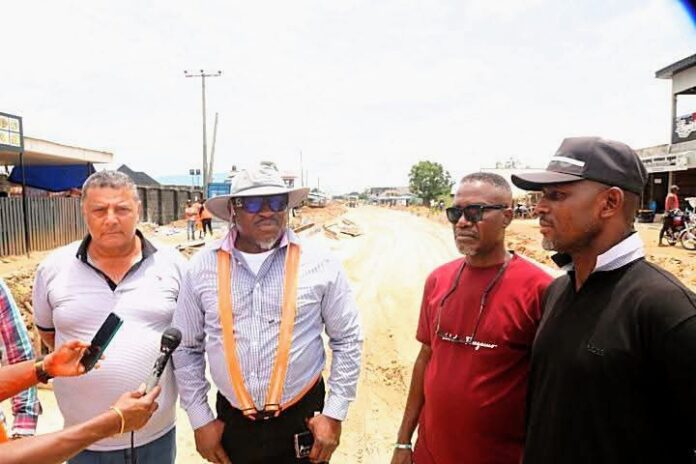Asaba, Delta State – July 28, 2025 — The Delta State Government is fast-tracking infrastructure development with a series of major road and flyover projects across key urban centers—Ughelli, Effurun, Warri, and Agbor. The goal is to ease traffic congestion, enhance road safety, support economic activities, and improve regional connectivity.
At the heart of the plan are flyovers and dual carriageways that target traffic-prone junctions while preserving communities and legacy sites. The Honourable Commissioner for Works (Urban and Highways), Hon. Reuben Izeze, provided extensive updates, outlining how these projects are transforming Delta’s road network under Governor Sheriff Oborevwori’s MORE Agenda.
Ughelli Flyover at Otovwodo Junction: Clearing Gridlock in the Gateway Town
The state government has approved the construction of a 382-meter flyover at Otovwodo Junction in Ughelli. The project includes dual lanes, a roundabout, connecting roads, and drainage infrastructure. The junction links three major highways: Benin–Lagos Expressway, Asaba–Ughelli Road, and the East–West Road to Patani.
The flyover is designed to:
- Eliminate long-standing traffic gridlock
- Shorten travel times
- Stimulate local business activities
- Improve road safety for all users
The project is scheduled to be completed in 24 months and has been awarded to reputable contractors.
Additionally, the federal government is dualizing the Abuja–Uromi–Sapele Road, a project that will increase vehicular traffic once completed—further justifying the need for the Ughelli flyover.
Effurun 5km Dual Carriage Road: Restoring Ease of Movement
The government also approved a 5-kilometer dual carriageway project from the Effurun Spare Parts Market down to Mercy Land Headquarters, extending beyond the first turn after Adabrassa and the Army checkpoint.
According to Hon. Izeze, “That particular spot has been a big problem for every passenger that has used that route. You can be there for four hours. We realized that, and His Excellency graciously approved the 10km.”
This intervention—costing approximately ₦35 billion—is being carried out by the state due to the underperformance of federal contractors. It is considered a federal road, and the state has taken over the project pending eventual reimbursement by the federal government.
Agbor Proposed Flyover: Safety and Access at a Critical Junction
In Agbor, the government is proposing a new flyover at Uromi Junction, a major intersection that connects the Eastern, Western, Northern, and Southern parts of Nigeria.
Why Agbor Needs a Flyover:
- Strategic Location – Uromi Junction serves as a national crossroads.
- Accident Zone – Inadequate channeling of traffic has led to repeated accidents.
- businesses suffer losses due to accidents and road safety issues.
- Safety Concerns – Indiscriminate pedestrian and motorcycle crossing frequently causes accidents and fatalities.
Scope of Work:
- 11-span flyover (330m) with 30m prestressed beams
- Dual-lane carriageway with service roads and two roundabouts (towards Igbanke and Abraka)
- 2.3km road spanning Uromi/Igbanke/Aliagwu across the Benin–Asaba Road
- Completion timeline: 24 months
Hon. Izeze emphasized that the government will award the contract to a reputable and experienced contractor following due diligence.
Warri–Effurun Flyovers: 3 Projects Nearing Completion
The commissioner also gave updates on ongoing flyover constructions in Effurun and Warri:
- Enerhen Junction Flyover – ~68% complete
- PTI Junction Flyover – ~64% complete
- DSC Roundabout Flyover – ~61% complete
- Effurun Roundabout – ~19% complete (pending resolution of compensation issues)
A new access road from PTI Junction to Osubi Airport has also been added. This road had previously been abandoned by another contractor but is now being handled by Julius Berger, the same firm constructing the flyovers.
All projects in the Warri–Effurun area are expected to be completed by March 31, 2026.
Why Project Costs Changed
Foreign exchange fluctuations have impacted the cost of some project components, especially imported materials like pre-stressed beams and transmission lines, which are priced in Euros. However, Hon. Izeze clarified that local materials like sand, granite, and labor have remained stable.
“His Excellency made sure that contracts were pegged to real exchange rates only for imported parts,” the commissioner explained, ensuring that cost overruns were controlled within reasonable limits.



